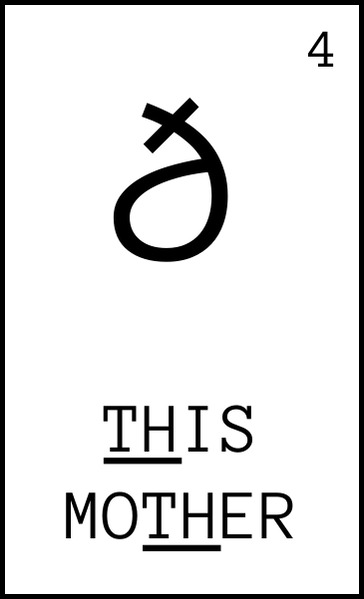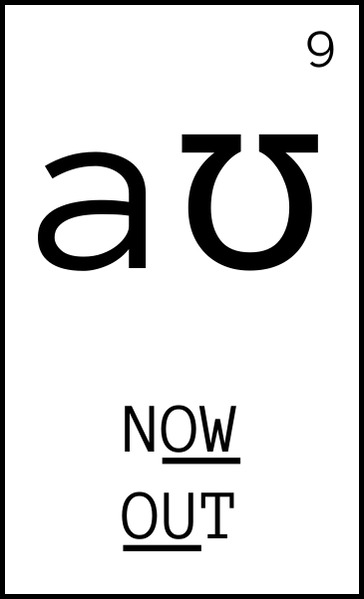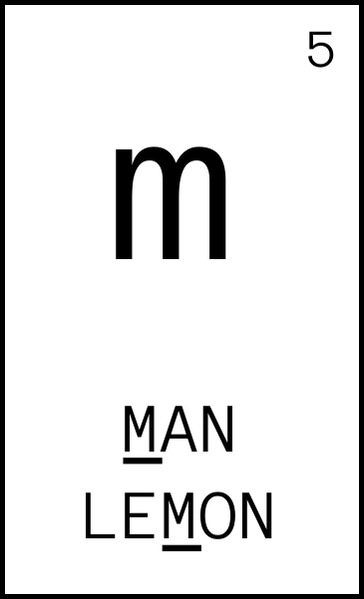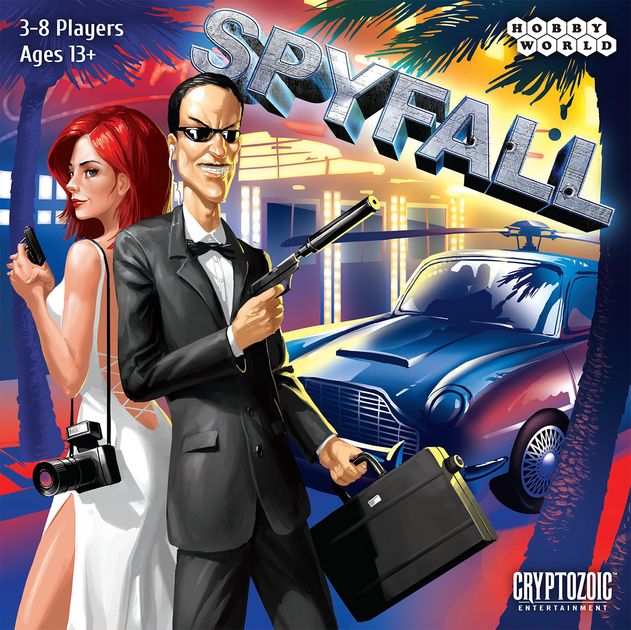o·no·ma (or o-no-ma) is a social game that teaches the linguistic concept of phonemes and the International Phonetic Alphabet (IPA), for beginning students of linguistics. Its main type of fun is sensation by letting players engage with the aural fun of breaking down words into sounds and combining them to make new words. It also provides fun as expression, as players are able to create unique sounds and argue for why their sounds fit a certain prompt (maybe ‘fst’ is the perfect sound for a microphone!). It also has an aspect of fun as fellowship, due to its inherent humor in making sounds from a limited number of phonemes and having to pitch those sounds to fellow players. Games similar to this are Scrabble and Cards Against Humanity.
In terms of more educational goals, o·no·ma intends for its players to be familiar with the IPA, be able to pronounce IPA symbols and give examples of words whose pronunciations contain those phonemes. I will measure them by conducting a pre-test and post-test with some IPA symbols from the game, asking players if they can pronounce them and give some examples of words containing them.
I want to do this kind of game because as an ESL learner, learning the IPA was a very useful way for me to learn English pronunciation, even though I know that this was not the ‘native speaker’ way to do this. But learning the IPA can be really difficult, so I wanted to make a game that makes it easier. (See future ideas for
My biggest concern is that the IPA / phonetics in general can be really boring. Additionally, there is a level of ‘uncanny valley’ since some IPA symbols look very similar to English letters, which can create a sense of discomfort / unwillingness to play in players. Because my game’s learning goals is that people are familiar with the IPA, I’m worried that people would not be willing to play a game with unfamiliar symbols.
Packaging (WIP):
Rules:
What are phonemes? (I’ve found that this is necessary for players to understand the goal of the game.)
 A phoneme is a perceptually distinct unit of sound. For example, ‘cat’ is made of 3 phonemes, /k/, /æ/, and /t/. One way to represent phonemes is as symbols in the International Phonetic Alphabet (IPA).
A phoneme is a perceptually distinct unit of sound. For example, ‘cat’ is made of 3 phonemes, /k/, /æ/, and /t/. One way to represent phonemes is as symbols in the International Phonetic Alphabet (IPA).
The phoneme cards in this game each has an IPA symbol that represents the phoneme, and 2 words that contain that phoneme. For example, the card to the right has the IPA symbol that represents the phoneme /ð/, which is found in the words ‘this’ and ‘mother’.

Some IPA symbols look like English letters, and some don’t! Some can even look like English lette
rs that they don’t sound like (check out the card to the left!). Use the words underneath the symbol to guide you in the pronunciation (the underlined portion is the part of the word that makes the sound matching the IPA symbol).
Goal:
Create a sound that the object or action depicted on the prompt card sounds like, using the phoneme cards you have.
For example, you can create the sound ‘meow’ using the following cards.



Another example! What sounds do these cards make?



(I think it makes something like, ‘hmph’.)
How to play:
- Each player chooses 7 random phoneme cards from the bag. At the start of each round, each player should only have 7 phoneme cards in their hands. Don’t show the phoneme cards to other players.
- Choose 1 player to be the ‘judge.’ The judge will rotate each round.
- The judge draws 3 prompt cards and show them to all players. These are prompt options for the players.
- If all players are more familiar with the game, draw only 1 prompt card (only 1 option).
- Each player (except for the judge) creates a sound that at least 1 object or action depicted on the 3 prompt cards sounds like, using the phoneme cards they have. Show the phoneme cards you use to make this sound to everyone else.
- Each player states which prompt card they chose from the 3 drawn cards pronounces their sound and makes the argument for how their sound can be what the prompt card sounds like.
- The judge chooses 1 winner from the players. Only the winner is awarded the total number of points on the cards they play.
- The judge can judge using whatever criteria. But they are recommended to choose the sound that best represents the chosen prompt card, and is NOT an existing sound (for example, making ‘meow’ for a cat seems like a cop out!)
- They should also NOT choose a word that is meaningfully related to the prompt card (for e.g., making ‘water’ for a glass).
- All players discard the phoneme cards they have played, and draw until they have 7 cards in their hand.
- Repeat the game from step 3: The next judge draws 3 prompt cards (or 1 prompt card), and so on!
- If there are no phoneme cards left, shuffle the discarded phoneme cards and put them back into the draw pile.
- The game ends when you run out of the prompt cards. Or when the players want it to end.
Game bits:
- 54 prompt cards. Each prompt card has a black-and-white illustration of an object, animal, action, etc.
- Phoneme cards. Each phoneme card has 1) the IPA symbol for that phoneme, 2) words whose pronunciation contains that phoneme (with the portion that is pronounced with that phoneme underlined), and 3) its point value. See appendix for the number of cards for each phoneme and the associated point value.
Assessment:
I want to assess how familiar players are with the IPA after playing o-no-ma. Specifically, the metrics I will be looking at are:
- Whether the player can pronounce the phoneme symbolized by an IPA symbol.
- Whether the player can provide at least 1 word that contains that phoneme.
Metric collection:
- Before the game, I will show players 3 phoneme cards (1 consonant, 1 vowel, 1 diphthong), covering the words underneath. I will ask them if they can make the sound symbolized by that symbol. If they are able to (it could be a fluke since some symbols are intuitive), I’ll ask them to provide 2 words with that sound.
- Repeat the process after at least 5 rounds of the game, making sure to use cards that have appeared in the game.
History (WIP):
Future Ideas:
- Since the inspiration of o·no·ma comes from being an ESL learner, I’m considering expanding this to really focus on that target audience. For example, cards can have English phonemes, and words containing that phonemes in both English and another language, to help bridge the gap between players’ first language and English.
- Creating blank prompt cards that the judge can fill out with their own pictorial prompt.
Print at home version (WIP):
Final playtest video (WIP):
Appendix:
Number of phoneme cards and point values
| Phonemes | Words | Number of cards | Point value |
| ə | AWAY, CINEMA | 25 | 1 |
| n | NO, TEN | 14 | 1 |
| t | TEA, GETTING | 12 | 1 |
| s | SUN, MISS | 10 | 2 |
| ɪ | HIT, SITTING | 8 | 3 |
| i: | SEE, HEAT | 8 | 3 |
| r | RED, TRY | 8 | 3 |
| e | MET, BED | 7 | 4 |
| d | DID, LADY | 7 | 4 |
| k | CAT, BACK | 7 | 4 |
| l | LEG, LITTLE | 7 | 4 |
| ð | THIS, MOTHER | 7 | 4 |
| aɪ | FIVE, EYE | 6 | 5 |
| m | MAN, LEMON | 6 | 5 |
| w | WET, WINDOW | 6 | 5 |
| z | ZOO, LAZY | 6 | 5 |
| æ | CAT, BLACK | 5 | 6 |
| ɜ:ʳ | TURN, LEARN | 4 | 7 |
| ɔ: | CALL, FOUR | 4 | 7 |
| eɪ | SAY, EIGHT | 4 | 7 |
| oʊ | GO, HOME | 4 | 7 |
| b | BAD, LAB | 4 | 7 |
| f | FIND, IF | 4 | 7 |
| p | PET, MAP | 4 | 7 |
| v | VOICE, FIVE | 4 | 7 |
| ɑ: | ARM, FATHER | 3 | 8 |
| u: | BLUE, FOOD | 3 | 8 |
| g | GIVE, FLAG | 3 | 8 |
| h | HOW, HELLO | 3 | 8 |
| j | YES, YELLOW | 3 | 8 |
| ŋ | SING, FINGER | 3 | 8 |
| ʌ | CUP, LUCK | 3 | 9 |
| ɒ | HOT, ROCK | 2 | 9 |
| ʊ | PUT, COULD | 2 | 9 |
| aʊ | NOW, OUT | 2 | 9 |
| ʃ | SHE, CRASH | 2 | 9 |
| θ | THINK, BOTH | 2 | 9 |
| dʒ | JUST, LARGE | 2 | 9 |
| ɔɪ | BOY, JOIN | 1 | 10 |
| eəʳ | WHERE, AIR | 1 | 10 |
| ɪəʳ | NEAR, HERE | 1 | 10 |
| ʊəʳ | PURE, TOURIS | 1 | 10 |
| tʃ | CHECK, CHURCH | 1 | 10 |
| ʒ | PLEASURE, VISION | 1 | 10 |
| [] | any sound | 20 | 0 |



Nice idea! Love the name “o-no-ma” and your learning tests. In future projects, please include your learning assessments outcome so we can get a sense of how well players perform on your learning objectives. Also, this post is missing iteration/playtesting documentation and a playtest video (the links on this page don’t point anywhere) —please fix this before the next project deadline!